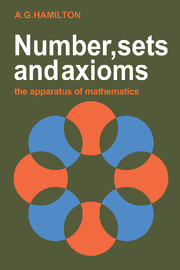Summary
Summary
The axiom of choice is stated in several different forms, and examples are given of its application in familiar situations. Proofs are given of many results mentioned in Chapters 2 and 3 which require the axiom of choice. The equivalence of the axiom of choice with Zorn's lemma and with the well-ordering theorem is proved. Details are given of several applications of Zorn's lemma, and there is some discussion of the consequences of the well-ordering theorem. The last section deals with some of the less acceptable consequences of the axiom of choice and with some weak versions of it. Lists are given of equivalents of the axiom of choice and of some important consequences of it.
Chapters 2 and 3 are prerequisites for this chapter. Chapter 4 provides a useful formal context for the ideas of this chapter, but it is not essential.
The axiom of choice and direct applications
Every infinite set has an infinite countable subset. Let us imagine how a proof of this might proceed. Given an infinite set A, choose an element a0 of A. Next, choose an element a1 of A different from a0. Next, choose a2∈A\{a0, a1}, and so on. Since A is infinite, the process never ends. A sequence a0, a1, a2,… of distinct elements of A is obtained, the elements of which constitute an infinite countable subset of A. Now this argument is certainly persuasive, and on an intuitive level it certainly justifies the conclusion. However, there is an informality about it which has disturbed mathematicians.
- Type
- Chapter
- Information
- Numbers, Sets and AxiomsThe Apparatus of Mathematics, pp. 163 - 191Publisher: Cambridge University PressPrint publication year: 1983



